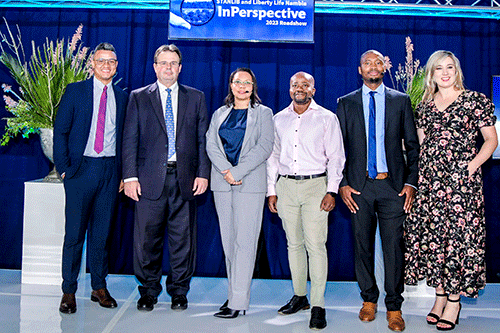High inflation rates continue to exacerbate the cost of living for Namibians, and many analysts believe these elevated interest rates will continue for the rest of the year. Although inflation is showing signs of moderation, this state of affairs is still making the cost of living unbearable for most Namibians.
These were some of the messages that emanated from STANLIB and Liberty Life Namibia’s first-ever combined roadshow on 29 and 30 March 2023 in Windhoek and Walvis Bay.
The 2023 InPerspective Roadshow set the scene for what investors can expect in the year ahead and beyond, and unpacked key investing themes and what these mean for economies around the globe, long-term investing decisions and importantly portfolio construction as well as the future of group risk benefits.
Speakers at the roadshow provided insight to bring clarity to investors in a world of volatility, uncertainty, complexity and ambiguity.
Sade Gertze, STANLIB Namibia, spoke about the Namibian economic landscape and pointed out that although the 2023 annual growth projection suggested that the global economy would avoid a recession, some economies would likely experience a recession at some point over the course of the year.
“Currently, the mining sector is leading the growth story largely due to higher production volumes from the diamond mining sector. Recent and expected further investment in mining infrastructure will possibly enhance capacity and output going forward. Developments in green hydrogen and offshore oil should also add to the growth prospects of the sector.”
Gertze said high inflation and high-interest rates are placing a huge burden on Namibians.
“We see that growth remains below pre-pandemic levels, although it has recovered about 98.7% of lockdown-induced losses, and we expect a positive but slow growth trajectory in 2023. Inflation is showing signs of moderation, and it is expected to roll over in the second half of 2023 on base effects. With the high conviction to support local economic recovery, the Central Bank is expected to maintain the Repo rate throughout 2023 and only start cutting rates in 2024, lagging the SARB with rate cuts”.
In his economic update, Kevin Lings, chief economist for STANLIB, concentrated on the consequences of fighting inflation, which was currently the biggest challenge facing the world economy. “The only way to get inflation down is to put up interest rates, and that has been the case, almost worldwide, but most certainly in the USA, Europe, South Africa and also Namibia”.
He forecast that interest rates would remain high for the remainder of 2023, further pointing out that these high rates have led to unaffordable housing – especially in the United States, dwindling prospective property buyers and an overall economic slowdown.
“In South Africa, load shedding and the energy crises is the biggest factor that influences the economy negatively. SA cannot move forward until they deal with load shedding. Mining production is declining, manufacturing is stagnating and the South African economy is not even back to pre-Covid levels,” he informed.
Business confidence continued to be at an all-time low – and even though corporates had big reserves and funds in their bank accounts – R1 trillion – they were currently not willing to spend any due to uncertainty on numerous levels.
On a positive note, Lings said tourist numbers were on the rise – albeit mostly in and around Cape Town, but “at least they are staying for one night or more”.
Furthermore, he explained, the private sector was also responding positively to investments in power projects.
“A total of 406 projects were completed last year, putting 1 664 megawatts into play, while in 2023, so far, we are looking at 40 projects with around 1 073 megawatts”.
He added that interest rates would come down next year and forecast a slight economic upswing for South Africa in 2024 with a GDP annual growth projection of 1.9%. “For now, however, protect your risk and let us get through 2023”.
Another speaker, Nyasha Masimbe, cast a look at the post-pandemic era and how insurance needs to adapt to changing circumstances of both companies and individuals. In his presentation, he advised that community well-being has become extremely important over the past three years, and insurance needs to adapt to changing lifestyles.
“There is no longer a one size fits all approach, and Liberty Life Namibia has crafted and evolved solutions that apply to different life stages and needs,” said Mashimbe.


